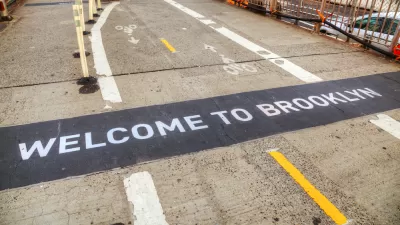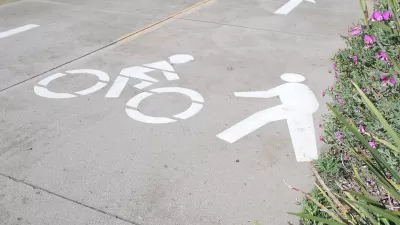Cycling advocates and environmental groups want to accelerate the expansion of bike infrastructure and fill crucial gaps in the city's bikeway network.

Environmental groups and cycling advocates in New York City are hoping to secure federal funding to build out and link the city's multi-use trails into a comprehensive network of greenways. According to Teri Carta, executive director of the Brooklyn Greenway Initiative, "without the greenways being connected, they are not able to deliver all of the benefits that they are capable of." Jose Martinez reports on the effort for The City.
"While City Hall has committed nearly $60 million through 2024 to annually expand the reach of bike lanes, the boosters of the five-borough greenway system envision larger swaths of car-free space appealing to more than just cyclists," writes Martinez. The goal is to expand open space available to communities for a variety of uses, not just moving bikes and people from place to place.
Around the country, cycling projects years in the making such as New York's 750-mile Empire State Trail and the 3,000-mile East Coast Greenway have gained steam in the past year. "The effort to obtain a chunk of Biden’s proposed transportation funding — which would include a broad scope of projects, including roads, bridges, mass transit and railroads — comes with New Yorkers increasingly prizing outdoor space, open streets and cycling during the pandemic." In 2020, New York City "added 45 miles of protected lanes and 29 miles of conventional lanes to a 1,375-mile bike lane network," which boosters now hope to improve and expand. "An infusion of federal money, the advocates say, could help connect missing links in a citywide network whose existing sections span the Hudson River in Manhattan, along Sunset Park’s industrialized waterfront in Brooklyn, the Bronx River and along the East River in Queens."
FULL STORY: Dream of Connected NYC Greenway Re-Envisioned as Path to COVID Recovery

Planetizen Federal Action Tracker
A weekly monitor of how Trump’s orders and actions are impacting planners and planning in America.

Maui's Vacation Rental Debate Turns Ugly
Verbal attacks, misinformation campaigns and fistfights plague a high-stakes debate to convert thousands of vacation rentals into long-term housing.

Restaurant Patios Were a Pandemic Win — Why Were They so Hard to Keep?
Social distancing requirements and changes in travel patterns prompted cities to pilot new uses for street and sidewalk space. Then it got complicated.

Charlottesville Temporarily Has No Zoning Code
A judge ordered the Virginia city to throw out its newly revised zoning code, leaving permitting for new development in legal limbo.

In California Battle of Housing vs. Environment, Housing Just Won
A new state law significantly limits the power of CEQA, an environmental review law that served as a powerful tool for blocking new development.

Boulder Eliminates Parking Minimums Citywide
Officials estimate the cost of building a single underground parking space at up to $100,000.
Urban Design for Planners 1: Software Tools
This six-course series explores essential urban design concepts using open source software and equips planners with the tools they need to participate fully in the urban design process.
Planning for Universal Design
Learn the tools for implementing Universal Design in planning regulations.
Heyer Gruel & Associates PA
JM Goldson LLC
Custer County Colorado
City of Camden Redevelopment Agency
City of Astoria
Transportation Research & Education Center (TREC) at Portland State University
Jefferson Parish Government
Camden Redevelopment Agency
City of Claremont





























